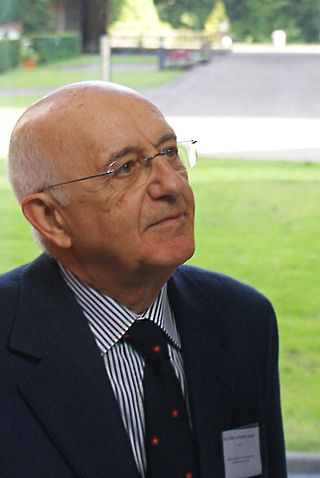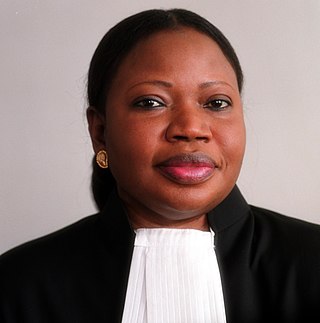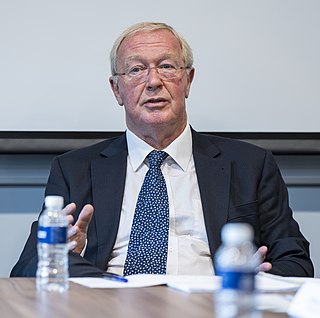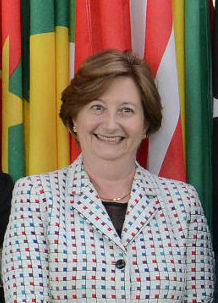Related Research Articles

The International Criminal Court is an intergovernmental organization and international tribunal seated in The Hague,Netherlands. It is the first and only permanent international court with jurisdiction to prosecute individuals for the international crimes of genocide,crimes against humanity,war crimes and the crime of aggression. It is distinct from the International Court of Justice,an organ of the United Nations that hears disputes between states.

International criminal law (ICL) is a body of public international law designed to prohibit certain categories of conduct commonly viewed as serious atrocities and to make perpetrators of such conduct criminally accountable for their perpetration. The core crimes under international law are genocide,war crimes,crimes against humanity,and the crime of aggression.

Antonio Cassese was an Italian jurist who specialized in public international law. He was the first President of the International Criminal Tribunal for the former Yugoslavia and the first President of the Special Tribunal for Lebanon which he presided over until his resignation on health grounds on 1 October 2011.

The International Criminal Court has opened investigations in Afghanistan,the Central African Republic,Côte d'Ivoire,Darfur,Sudan,the Democratic Republic of the Congo,Kenya,Libya,Uganda,Bangladesh/Myanmar,Palestine and Venezuela. Additionally,the Office of the Prosecutor conducted preliminary examinations in situations in Bolivia,Colombia,Guinea,Iraq / the United Kingdom,Nigeria,Georgia,Honduras,South Korea,Ukraine and Venezuela. Preliminary investigations were closed in Gabon;Honduras;registered vessels of Comoros,Greece,and Cambodia;South Korea;and Colombia on events since 1 July 2002.
Christine,Baroness Van den Wyngaert is a Belgian jurist and judge. She served as international and comparative criminal law expert from 2009 to 2018 as a judge on the International Criminal Court. She served in the Trial Division Chamber. On 8 July 2013,Van den Wyngaert was ennobled by King Albert II of Belgium as a baroness for her services as a judge. From 2003 to 2005 she was a Judge at the International Criminal Tribunal for the former Yugoslavia,and from 2000 to 2002 an ad hoc judge on the International Court of Justice.

The Special Tribunal for Lebanon (STL),also referred to as the Lebanon Tribunal or the Hariri Tribunal,is a tribunal of international character applying Lebanese criminal law to carry out the investigation and prosecution of those responsible for 14 February 2005 assassination of Rafic Hariri,the former Lebanese prime minister,and the deaths of 21 others,as well as those responsible for connected attacks.

Karim Asad Ahmad Khan is a British lawyer specialising in international criminal law and international human rights law,who has served as Prosecutor of the International Criminal Court since 2021.

Fatou Bom Bensouda is a Gambian lawyer and former Prosecutor of the International Criminal Court (ICC),who has served as the Gambian High Commissioner to the United Kingdom since 3 August 2022.

Charles Ayodeji Adeogun-Phillips is a former United Nations genocide and war crimes prosecutor,international lawyer and founder of Charles Anthony (Lawyers) LLP.

Luis Moreno Ocampo is an Argentine lawyer who served as the first Prosecutor of the International Criminal Court (ICC) from 2003 to 2012. Previously,he played a major role in Argentina's democratic transition (1983–1991).

Sir Howard Andrew Clive Morrison,is a British lawyer and from 2011 to 2021 a Judge of the International Criminal Court based in The Hague,Netherlands. Currently UK advisor on war crimes to the Ukrainian Prosecutor General.

The International Criminal Court investigation in Kenya or the situation in the Republic of Kenya was an investigation by the International Criminal Court (ICC) into the responsibility for the 2007–2008 post-election violence in Kenya. The 2007–2008 crisis followed the presidential election that was held on 27 December 2007. The Electoral Commission of Kenya officially declared that the incumbent President Mwai Kibaki was re-elected however supporters of the opposition candidate Raila Odinga accused the government of electoral fraud and rejected the results. A series of protests and demonstrations followed,and fighting—mainly along tribal lines—led to an estimated 1,200 deaths and more than 500,000 people becoming internally displaced.

Joyce Aluoch is a Kenyan lawyer who served as Judge of the International Criminal Court from 2009 until 2018. She is a former judge of the High Court of Kenya. In addition to her career as a judge,she was the First Chairperson of the Committee of African Union Experts on the Rights and Welfare of the Child and the Vice-Chairperson of the United Nations Committee on the Rights of the Child from 2003 to 2009. She has also served as the inaugural head of the family division of the Kenyan High Court and a member of the Court of Appeal.

Silvia Alejandra Fernández de Gurmendi is an Argentine lawyer,diplomat and judge. She has been a judge at the International Criminal Court (ICC) since 20 January 2010 and President of the ICC from March 2015 to March 2018. She was elected to the presidency for a three-year term and served until March 2018. In 2020 she was elected to serve as President of the Assembly of States Parties to Rome Statute of the International Criminal Court for the twentieth to twenty-second sessions (2021-2023).

Chile Eboe-Osuji is a Distinguished International Jurist at the Lincoln Alexander School of Law and a Special Advisor to the President's Office at Toronto Metropolitan University. In his role at the Lincoln Alexander School of Law,Eboe-Osuji is leading discussions on the international human rights regime,the international humanitarian law regime,the role of international courts/tribunals,and the rule of law. He will also play a key role in advancing Lincoln Alexander Law's international profile through teaching initiatives,programmatic collaborations,and public discourse. Prior to joining the law school,Eboe-Osuji served as the President of the International Criminal Court,The Hague from March 2018 to March 2021. The Nigerian-born Eboe-Osuji was also concurrently serving as a senior judge in the Appeals Division of the ICC during this time. Prior to his work with the International Criminal Court,he was the Legal Advisor to the United Nations High Commissioner for Human Rights in Geneva. He also served at various times as a senior prosecutor at both the International Criminal Tribunal for Rwanda and the Special Court for Sierra Leone.
Kuniko Ozaki,is a Japanese lawyer who served as judge of the International Criminal Court and the Presiding Judge of Trial Chamber V,constituted to try the cases against four Kenyan nationals. Specially-appointed professor of International Human Right Law at Chuo University Faculty of Law (2021-).
James Kirkpatrick Stewart is a Canadian lawyer with over thirty years of experience as Crown counsel handling criminal trials and appeals for the prosecution,including more than eight years working with the United Nations in international criminal law prosecutions as a trial and appellate counsel and legal manager. Stewart was nominated by Fatou Bensouda,Prosecutor for the International Criminal Court (ICC) in The Hague,as one of three candidates for election to the post of ICC Deputy Prosecutor (Prosecution). He was duly elected by the Assembly of States Parties on 16 November 2012 for a period of nine years. Mr Stewart was sworn in on 8 March 2013 and as Deputy Prosecutor of the ICC,he will report directly to the Prosecutor.
Antoine Kesia-Mbe Mindua is a Congolese lawyer who is currently a judge of the International Criminal Court. He was previously a judge of the International Criminal Tribunal for the former Yugoslavia.
Solome Balungi Bossa,,is a Ugandan judge on the International Criminal Court (ICC). Prior to her election to the ICC,she was a member of the Court of Appeal in Uganda,which also doubles as the Constitutional Court in the Judiciary of Uganda. She was elected to a nine-year term on 5 December 2017 and was sworn in on 9 March 2018. Previously she was appointed to a six-year term on the African Court on Human and Peoples' Rights in 2014.
References
- ↑ Kibuuka, Hudson. "Daniel D. Ntande Nsereko". College and University Dialogue. Retrieved 14 September 2020.
- ↑ "Judge Daniel Nsereko". Special Tribunal for Lebanon.
- ↑ Osike, Felix; Candia, Steven (17 July 2007). "Uganda: Lawyer Nominated for ICC Judge". New Vision .
- ↑ "Trial of Congolese militia leader can proceed, International Criminal Court rules". UN News. 25 September 2009. Retrieved 13 September 2020.
- ↑ Jalloh, Charles Chernor (2012). "Situation in the Republic of Kenya". American Journal of International Law . 106 (1). 121, note 9. doi:10.5305/amerjintelaw.106.1.0118. ISSN 0002-9300. S2CID 229170516.
- ↑ "International Criminal Court case against Kenyan officials to proceed". UN News. 30 August 2011. Retrieved 13 September 2020.
- ↑ "New STL Prosecutor, Appeals Chamber Judge Sworn in". Naharnet . 12 March 2012. Retrieved 13 September 2020.
- ↑ "United Nations appoints Norman Farrell as STL prosecutor". The Daily Star . 1 March 2012. ISSN 1027-3883. ProQuest document ID 925643521.